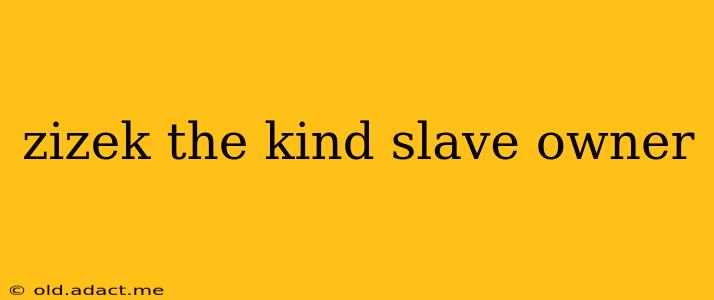Žižek: The "Kind" Slave Owner? Deconstructing the Paradox
Slavery, a brutal system built on exploitation and dehumanization, is irreconcilable with the notion of "kindness." Yet, the provocative thought experiments of the Slovenian philosopher Slavoj Žižek often lead us down unexpected paths, challenging our ingrained assumptions. While Žižek never explicitly advocates for "kind" slave ownership, his work compels us to confront the complexities of ideology and power, even venturing into uncomfortable territory to expose the hidden mechanisms of oppression. This essay will explore how Žižek's philosophical framework might inadvertently touch upon this seemingly paradoxical concept, clarifying his position and addressing common misconceptions.
It's crucial to preface this discussion by stating unequivocally that Žižek does not endorse slavery in any form. His work, however, analyzes the insidious nature of ideological structures that enable and perpetuate injustice, even those that appear benevolent on the surface. This involves dissecting the subtle ways power operates, often masked by seemingly benign rhetoric.
How might Žižek approach the concept of a "kind" slave owner?
Žižek's analysis would likely focus on the inherent contradiction: a system predicated on the denial of another's humanity cannot, by its very nature, be considered "kind." Any apparent benevolence would merely be a sophisticated form of ideological camouflage, concealing the brutal reality of exploitation. A "kind" slave owner, in Žižek's framework, might be seen as a master of ideological manipulation, expertly deploying strategies to maintain the power imbalance while appearing compassionate.
What are the ideological mechanisms at play?
Žižek might argue that the "kindness" displayed by such a slave owner is a strategic tool, serving to reinforce the system of domination rather than challenge it. This kindness becomes a means of controlling and pacifying the enslaved population, creating a false sense of security and preventing rebellion. The master's apparent benevolence masks the fundamental injustice at the core of the relationship.
Could Žižek’s work be misinterpreted to support such a notion?
Some might misinterpret Žižek's focus on the complexities of ideology to suggest a justification for even seemingly benevolent forms of oppression. However, such an interpretation misses the critical point: Žižek's work aims to expose the mechanisms of power, not to endorse them. His unsettling thought experiments are designed to force us to confront the uncomfortable truths behind seemingly benign systems.
Isn't this a dangerous line of philosophical inquiry?
Yes, engaging with such sensitive topics requires utmost caution. It's crucial to approach Žižek's work with critical awareness, understanding the intent behind his thought experiments. His objective is not to condone brutality but to dismantle the ideological structures that enable it.
What other aspects of power would Žižek examine in this context?
Žižek would likely explore the role of symbolic violence, the ways in which power operates through seemingly consensual mechanisms. The "kind" slave owner might not employ overt physical force but might instead utilize subtle forms of manipulation, fostering dependency and internalizing the master's ideology.
In conclusion: The concept of a "kind" slave owner is an oxymoron. Žižek’s philosophical framework, while complex and challenging, serves as a tool for critically examining the often hidden mechanisms of power and oppression, revealing the inherent contradictions in systems that claim benevolence while perpetuating injustice. Any apparent kindness within a system of slavery would, in Žižekian terms, be nothing more than a sophisticated form of ideological control. It's crucial to remember that Žižek’s provocative analyses aim to dismantle oppressive systems, not to legitimize them.
